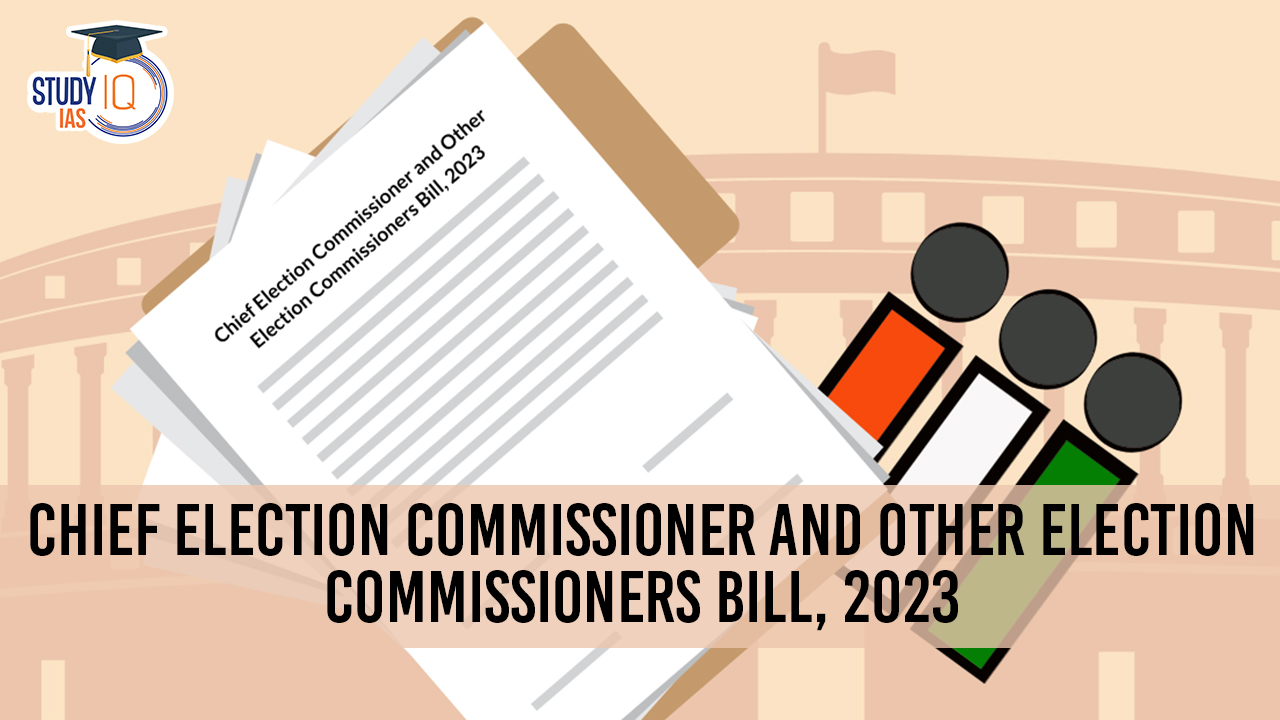Table of Contents
Context: The Chief Election Commissioner and Other Election Commissioners (Appointment, Conditions of Service and Term of Office) Act, 2023 introduced a significant change in the selection process for the CEC and Election Commissioners (ECs).
About Appointment of Chief Election Commissioner
- Article 324: It says CEC and ECs will be appointed by the President, this is subject to Parliamentary law (if such law exists).
- Intervention of Supreme Court: In 2023, the Constitution Bench of the SC in Anoop Baranwal v. Union of India case changed the process for Election Commission appointments in order to secure their independence.
- It created a committee comprising the PM, the Leader of the Opposition in Parliament and the Chief Justice of India (CJI).
- This committee will make recommendations and advise the President on Election Commission appointments until Parliament enacts a separate law on the subject.
- Changes in the 2023 Act:
- The CJI was excluded from the Selection Committee.
- The two current ECs, Gyanesh Kumar and Sukhbir Singh Sandhu were appointed under this provision.
Traditional Practice and Changes Introduced
- Traditional Practice: The CEC’s successor was traditionally chosen from within the Election Commission, generally the senior-most EC.
- New Provision: The 2023 Act allows for the appointment of individuals from outside the Election Commission, widening the pool of eligible candidates.
Key Provisions of the 2023 Act
- Section 5: Eligibility – Candidates for the post of CEC and ECs must be current or former Secretary-level officers.
- Section 6: Search Committee – A Search Committee, chaired by the Law Minister, prepares a panel of 5 names for consideration.
- The Search Committee includes two other members, both holding ranks not below Secretary to the Government of India.
- Section 7: Selection Committee – The Selection Committee includes:
- Prime Minister
- A Cabinet Minister
- Leader of the Opposition in the Lok Sabha or leader of the single largest opposition party.
- This committee can choose from the panel prepared by the Search Committee or consider “any other person” outside the Election Commission.
Key Highlights Of Chief Election Commissioner And Other Election Commissioner Bill, 2023
The new bill replaces the Election Commission (Conditions of Service of Election Commissioners and Transaction of Business) Act, 1991. It provides for the following:
- Appointment Process: The Chief Election Commissioner (CEC) and Election Commissioners (ECs) will be appointed by the President upon the recommendation of a Selection Committee.
- Selection Committee: The Selection Committee will consist of:
- Prime Minister
- Union Cabinet Minister
- Leader of Opposition/leader of the largest opposition party in Lok Sabha
- Search Committee: A Search Committee headed by the Cabinet Secretary will propose a panel of names to the Selection Committee.
- Eligibility: To be eligible for the posts, candidates must have held (or currently hold) a post equivalent to the Secretary to the central government.
- Salary and Conditions of Service: The salary and conditions of service of the CEC and ECs will be equivalent to that of a Cabinet Secretary. This is a change from the 1991 Act, which pegged their salary to that of a Supreme Court Judge.
Issues and Concerns Associated with the Bill
- Issue surrounding recommendation of Selection Committee: The Bill upholds the validity of the Selection Committee even if there is a vacancy or defect in constituting the Committee. However, of the 3 members, only the post of Leader of Opposition in the Lok Sabha can be vacant. This means a situation can arise where before elections the selection committee will consist exclusively of the ruling party.
- Selection committee may overlook Search committee recommendations: The selection committee can go beyond the names suggested by the Search committee. This will undermine the role of the Search committee which specifically holds the expertise to look for potential candidates.
- Government Influence on CEC and EC Salaries: The Bill proposes equating the salaries of the Chief Election Commissioner (CEC) and Election Commissioners (ECs) with that of the Cabinet Secretary.
- This change could potentially increase executive influence over the CEC and ECs’ salaries as the Cabinet Secretary’s salary is determined by the Government based on the recommendation of the Central Pay Commission.
- Restrictive Eligibility for CEC and EC’s: The Bill stipulation that only individuals of Secretary rank or above in government are eligible for the roles of Chief Election Commissioner (CEC) and Election Commissioners (ECs) may preclude other capable candidates. This criterion overlooks the Election Commission’s quasi-judicial functions, like adjudicating parliamentary disqualification and political party disputes.
- Concerns with Composition of Selection Commission: The proposed Selection Committee for appointing the CEC and ECs, comprising the Prime Minister, a Cabinet Minister, and the Leader of the Opposition, raises concerns about potential government dominance in the appointment process.
- ECI’s constitutional role and duties necessitate a more independent appointment mechanism, as directed by the Supreme Court.
Suggestions of various Commissions/Courts
Here are some suggestions of various Commissions/Courts for the composition of the Selection Committee:
| Body | Members |
| Goswami Committee (1990) |
|
| National Commission to Review the Working of the Constitution Report (2002) | Prime Minister + Leader of the Opposition in Lok Sabha + the Leader of the Opposition in Rajya Sabha + the Speaker of Lok Sabha + the Deputy Chairman of Rajya Sabha. |
| Law Commission (2015) | Prime Minister + the Leader of Opposition of Lok Sabha (or the leader of the largest opposition party in Lok Sabha) + the Chief Justice. |
| Supreme Court (2023)
(Anoop Baranwal v. Union of India Case) |
Prime Minister + Leader of Opposition in Lok Sabha (or leader of the single largest opposition party in Lok Sabha) + Chief Justice. |
Best Practices: Selection Process of the Election Commission in other countries
- United Kingdom: The Election commissioner is appointed by the Monarch upon the approval of the House of Commons.
- United States: The commission is appointed by the President and confirmed by the Senate.
- Canada: Appointed by the resolution of the House of Commons.


 Indian Secularism: Constitutional Provis...
Indian Secularism: Constitutional Provis...
 RailOne App: Indian Railways Launches Al...
RailOne App: Indian Railways Launches Al...
 Special Intensive Revision (SIR) of Elec...
Special Intensive Revision (SIR) of Elec...





















